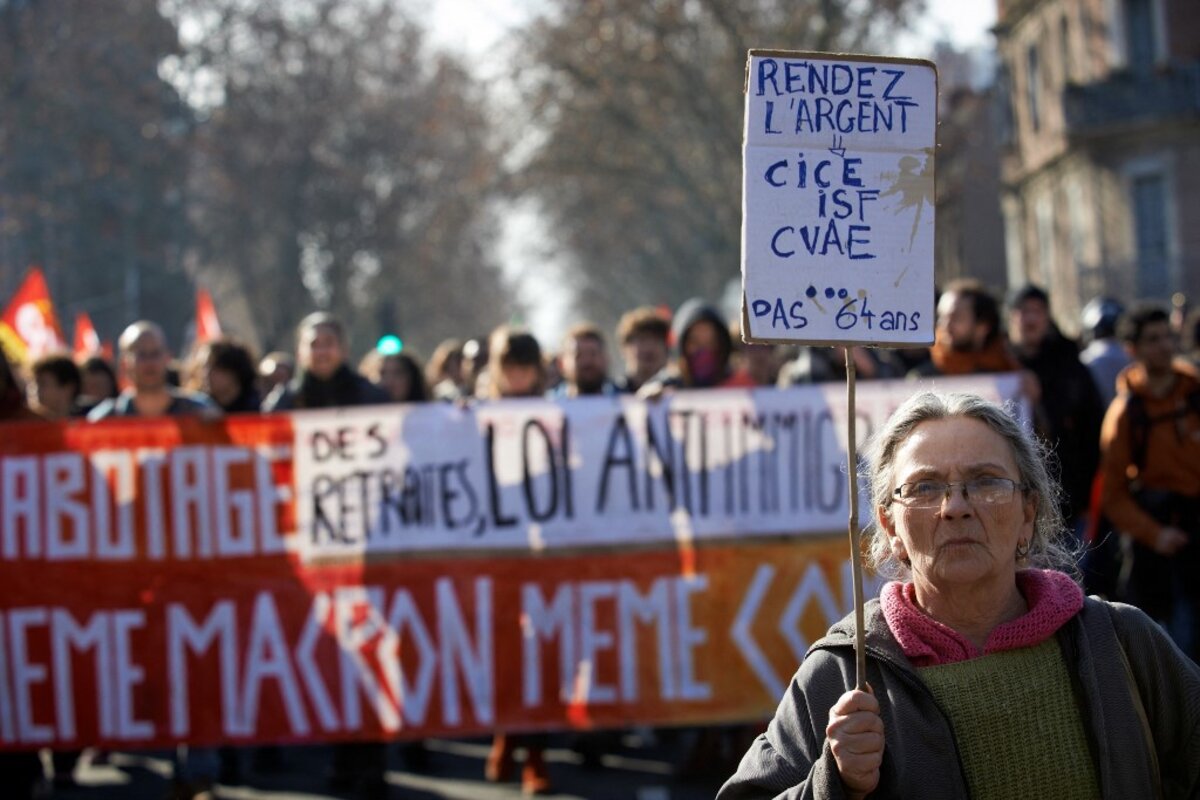During the series of nationwide demonstrations and marches against Emmanuel Macron’s reform of the pensions system, which includes raising the general retirement age on full pension rights from 62 to 64, a recurrent and popular demand chanted by the protestors is“Tax the rich!” instead.
The injustice of the different treatment given to, on the one hand, a cast of extremely privileged people who are allowed to escape taxes and, on the other, a people who are relentlessly asked to make further sacrifices for the social good has now become anchored in the minds of many. Even among a so-called “economic elite”, who are habitually in favour of the introduction of reforms in favour of the camp of capital, there are those who agree that there is now a need for a greater contribution from the most wealthy.
They include Jacques Attali, the high-flying former president of the European Bank for Reconstruction and Development, who for decades has served as a political and economic advisor to a succession of French presidents, from the late François Mitterrand up to, and including, Emmanuel Macron. In an interview with BFMTV earlier this month, the 79-year-old said that rather than embarking on a risky reform of the pensions system, it would be preferable to look for the billions of euros the overhaul is supposed to provide “in taxes on the most wealthy”.
Also this month, Patrick Artus, the chief economist for the French corporate and investment bank Natixis, told financial magazine Le Revenu that to meet the current major economic challenges “the state should more strongly tax the wealth of the richest households”.

Enlargement : Illustration 1

While more moderate, François Villeroy de Galhau, governor of the Bank of France, called on the government to be more measured in its fiscal policy. “Let’s stop the race for reducing taxes in this country, above all with the deficits that we have,” he said in an interview in February with TV channel France 2.
“The super-rich, meaning the billionaires and the people whose wealth is worth hundreds of millions of euros, pay twice as less in taxes, in proportion to their revenue, than the rest of the population,” said French economist Gabriel Zucman, associate professor of public policy and economics at the University of California, Berkely, in an address to a March 14th conference in Paris organised by the Institute for International and Strategic Affairs (IRIS).
Referring to research by the French Institute of Public Policies (IPP), Zucman argued that “almost all of the categories of the population – the working, low-income, middle and upper classes – give around fifty percent of their revenue to taxes, whether that be by income tax, VAT or property tax, whereas the super-rich, they only pay between twenty and twenty-five percent.” Income tax, he added, “dramatically fails to tax the wealthiest”.
“Concretely, the 370 richest families are effectively taxed at only about two or three percent through income tax,” Zucman said, and this because they systematically turn to “shell companies and holdings whose influx of dividends are not submitted to income tax”.
More precise figures on the subject are due to be published by the IPP in May and, according to an article in the economic affairs magazine Challenges, may well prove to be a “bomb”. IPP researchers were able to obtain data from the French tax authorities comparing ordinary household returns with those of corporate shareholders. According to Challenges, the IPP found that, with regard to their total wealth, the richest 0.1% of the French population are taxed just 2% of their accumulated wealth, and that for “the 0.0001% of the richest, the tax rate tends towards zero (0.11%)”.
The debate over re-introducing a wealth tax
For Gabriel Zucman, “the only way of attacking this social injustice is to create a wealth tax,” which was abolished in France by Macron in 2018. He told the IRIS conference this month that from a purely financial point of view – which is what the French government cites to justify the pensions reform – a new wealth tax on the super-rich could bring a massive amount into the public purse.
Zucman said that by his own calculations, the introduction in France of a tax on the very wealthy, along the lines of the model proposed by US leftwing politicians Bernie Sanders and Elizabeth Warren, as of “a wealth of 20 or 30 million euros with a progressive rate of a few percentage points – three, four and five percent for billionaires – France could collect one [percentage] point of GDP in extra revenue each year, meaning between 20 and 25 billion euros”. That, he underlined, “is twice as much as the government initially hoped for with its pensions reform”.
But for Emmanuel Macron and his government, there is no question of bailing out the public accounts through raising taxation on the super-rich. Every time the highly politically sensitive question of a wealth tax comes back into debate, the president and his ministers defend its abolishment. Neither the “yellow vest” popular uprising, nor the Covid-19 crisis, nor the return of inflation, have shaken their beliefs.

Enlargement : Illustration 2

During the parliamentary debates last autumn over the yearly public budget bill, re-introducing a wealth tax was raised by a number of Members of Parliament from the leftwing opposition. But the public accounts minister, Gabriel Attal, was unmoved. “To take the opposite path on taxation would be the same for employment,” he told them. “You would re-plunge millions of French people into unemployment, companies would again find themselves without capital, without investment.”
Ineffective reforms
But the problem with Attal’s claims is that no serious economic study confirms what he said. Notably, the evaluation committee of France Stratégie, a body attached to the French prime minister’s office, has until now been incapable of providing the proof of any beneficial effect of lowering taxation on the wealthiest. When, in 2018, the wealth tax in France (called the ISF) was abolished in favour of a tax on property assets (the IFI), it had no effect upon business investment or salaries.
Similarly, regarding the introduction of a 30% flat tax on capital income (PFU), also in 2018, the France Stratégie evaluation committee reported that until now it had “no impact on investment and salaries”. France Stratégie even underlined that, regarding such reforms, there are “numerous academic studies available at an international level which fail to show that a modification of taxes on capital […] could have a notable effect on the real behaviour of corporations, as much with regard to investment as to employment demand”.
However, it is established that the abolishment of the ISF wealth tax and the introduction of the PFU flat tax have swollen the bank accounts of the wealthiest. Another IPP study (in French, here) set out how “the greater gains for the highest incomes are explained both by the transformation of the ISF [wealth tax] into the ISF [tax on property assets] and by the introduction of the single rate [flat tax] levy, (PFU), on income from capital”.
Finally, the PFU flat tax has clearly had the effect of raising the value of dividend payments declared every year in income tax in France by about 9 billion euros, representing a 60% rise on the declared value before the introduction of the PFU.
In sum, raising taxes on the wealthiest in France would be in no way unreasonable from an economic point of view. Despite the refusal by the executive to introduce such measures, those in favour of the wealth tax may yet find satisfaction at a European Union level, or at the Organisation for Economic Co-operation and Development (OECD).
In a campaign led jointly by Aurore Lalucq, a French economist and centre-left Member of the European Parliament (MEP) and Gabriel Zucman, 131 MEPs this month signed a petition in favour of the introduction of an international wealth tax. The idea behind this is to proceed in the same manner as the international agreement reached on a minimum taxation of 15% of the profits of multinational corporations which have a turnover of more than 750 million euros.
In an op-ed article co-signed by Lalucq and Zucman published in French daily Le Monde on March 14th, they detailed their proposition “to introduce, at an international level, a wealth tax on the super-rich [at a rate] of 1.5% as of 50 million euros of wealth, in order to reduce inequalities while also financing necessary investments for the ecological and social transition”. The move is supported by Nobel Prize-winning economist Joseph Stiglitz, a former senior vice-president and chief economist of the World Bank.
“There is an institutional revolution to be had in Europe, because to ratify the tax reforms, there must be unanimity among members of the [European] Council, which often creates blockages,” commented Lalucq. With wealth taxes abolished by nearly all the countries on the continent, reaching a consensus for an international wealth tax appears as a particularly challenging task.
“A large number of states must kiss goodbye to this happy globalisation which promised that thanks to the lowering of taxes and duties, growth would be continuous and the world a better place,” said Lalucq, adding: “The French government the first.”
-------------------------
- The original French version of this report can be found here.
English version by Graham Tearse


